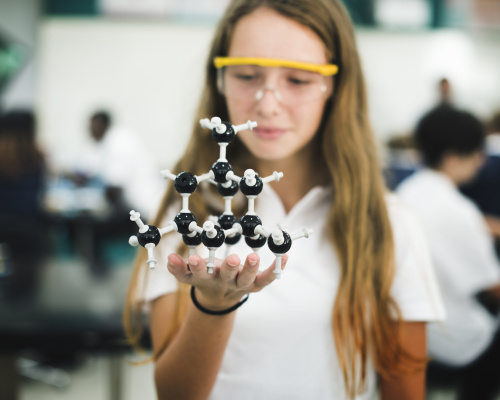Top Science Education Take-Aways from NSTA18
Date
This March, hundreds of scientists descended on Atlanta to commune and collaborate over best practices in the science classroom. The National Science Teachers’ Association (NSTA) Annual Conference was an enormous success this year, with hundreds of sessions (plus my own!) offering professional development, pedagogical insights, and plenty of chemical reactions. Here are my main takeaways from this year:
1. Next-level, high-quality, free stuff is just getting better.
I was blown away by the amount of free, easy-access, and even Open-Educational Resources (OER) that I saw this year. My top favorites included Google’s new Science Journal App with a suite of lessons and videos in collaboration with the band, OK GO. The app externalizes that data that a smartphone is already gathering, transforming the ubiquitous teenage tool into a complete science toolkit! Get ready to explore science alongside the band and unpack all of the concepts that go into their famous music videos.
I was just as encouraged by the many sessions hosted by the National Oceanic and Atmospheric Association (NOAA)—if science teachers need legitimate, up-to-date and data-rich lessons, they needn’t look further. With curriculum dedicated to exploring real-world issues like ocean acidification, coral bleaching, and El Nino, these standards-aligned modules provide a project-based breeding ground.
2. Teachers Still Need Help Understanding the Next Generation Science Standards (NGSS).
My session was a 30-minute “blitz” entitled “Stop Nodding Along and Start Understanding the NGSS.” It was geared towards those new to the standards, or those who simply need the verbiage to explain it to their larger team.
- “What does ‘DCI’ stand for?” “
- "Where did the standards come from?”
- “How do I read a standards sheet?”
- “Why does everyone keep talking about ‘phenomena?’”
All of these questions are fundamental, not only to science education, but to demystifying almost all of the sessions at the conference! Of course, the next session I went to featured a presentation about curriculum aligned to the NGSS, and yet a teacher raised her hand early in the session and asked, “What is a CCC?” This educator would be getting far less out of the session that she would have had she a deep understanding of the standards. The solution? Allow me to explain!
3. NGSS-aligned assessments are still a bit of a head-scratcher… for all of us.
Even those of us that have a great handle on the standards are still deep in conversation about how to assess them, especially at the state-level in a “standardized” fashion. The truth is, the standards are so complete and robust that a one-stop-shop state assessment of them cannot be codified easily. Need to grade tens of thousands of exams in a timely fashion? Need to design a computer-based science exam that is open-ended enough to check for true scientific practices while remaining gradable by an algorithm? Yes, and it’s a real design challenge. Kentucky, one of the first NGSS adopters, seems to be leading the way with their “closet” of “through-course tasks,” and has rolled out their statewide assessment this year. They are modeling an assessment system, in which the single-turn state test isn't the only answer; what occurs in the classroom is just as formative and essential. Yet, that “closet” isn’t being shared with the world at-large, and the statewide results haven’t come it. The takeaway? You’re not alone if you’re still figuring out how to assess science learning.
4. Accessibility in the Science Classroom is Getting the Exposure it Deserves.
I’ve been a follower, student, and advocate of Universal Design for Learning (UDL) for a while now, and this is the first NSTA conference where I’ve really seen equity as a top-billed issue, going beyond the “Girls in STEM” narrative (which is still important!) to a deeper investigation of accessibility for all students. One of my favorite sessions I attended was hosted by Beth Daniels, the STEM director of Twin Cities PBS. She forecasted the upcoming show with the working title “Hero Elementary,” which will feature a varied cast (with a diverse set of learning languages and abilities) who all use science and superpowers to make sense of the world around them. The writing team operates with UDL principles for science material aligned to the Science and Engineering Practices of the NGSS. The show will be supplemented with an app designed for at-home, family-oriented science exploration. The show is being focus-grouped by real children and their guardians. Stay tuned for the show, as you’re among the first to hear of the recent developments!

